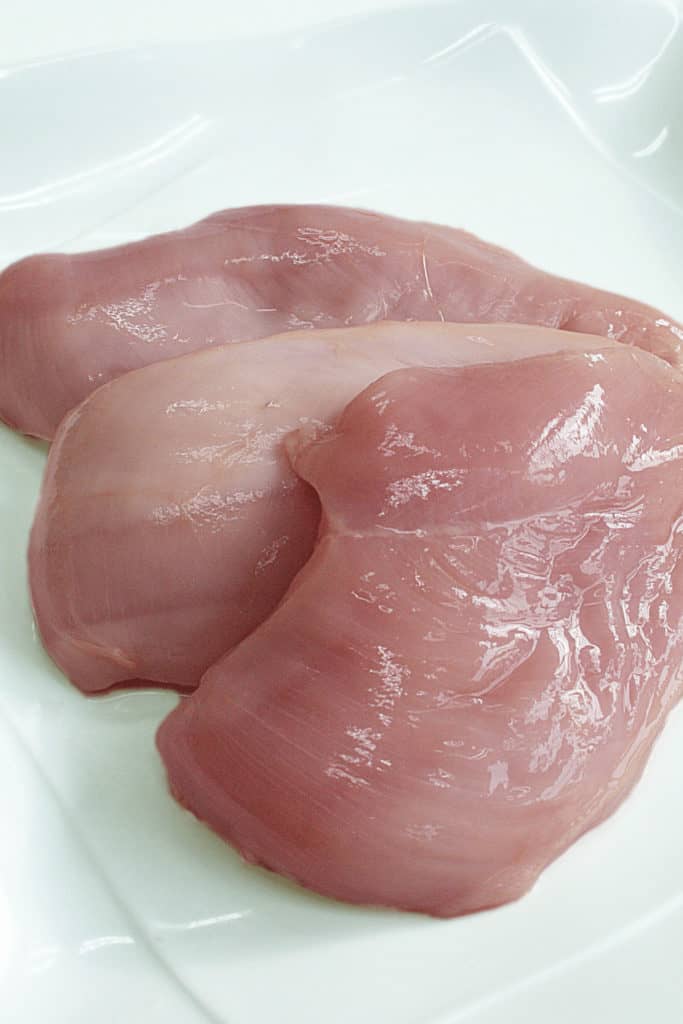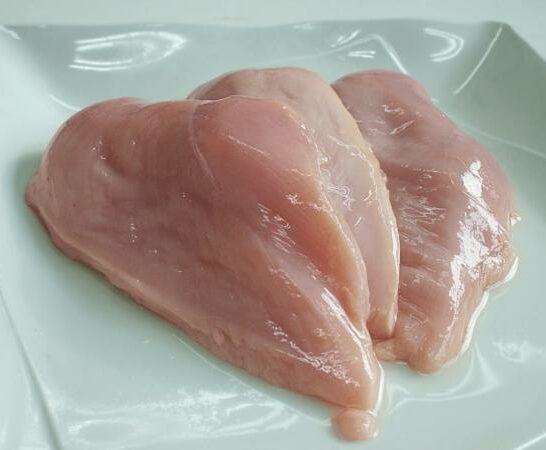My chicken is slimy after defrosting. There’s nothing better than a roast chicken or deboned chicken breasts roasting in the oven. So imagine my shock when I defrosted some chicken breasts that I had frozen only to discover they had a weird slimy feel.
Why is my Chicken Slimy After Defrosting?
Usually, the chicken I buy from the frozen section at the supermarket doesn’t have this texture or feeling. I was instantly concerned. Was this chicken off, or could I still prepare it for my family? After all, I had heard how bad salmonella poisoning was, and I didn’t want to end up rushing my kids to the ER just because I foolishly prepared them some off meat.
Why Is Chicken Slimy After Defrosting?
Chicken that is very slimy after being defrosted may have been exposed to bacteria that have begun decomposition, which is why it feels slimy. However, the number of bacteria the chicken has been exposed to will determine whether the chicken is still edible or unsafe to prepare. Since chicken is not eaten raw, the introduction of heat and thorough cooking of the chicken can destroy mild bacterial exposure.

However, if the chicken is served “rare,” it should be immediately thrown away if there is any slimy feel to it.
Causes of Slimy Chicken After Defrosting
I ran an online search, and since I wasn’t happy with the average Q&A answers, I dove deeper and contacted the young dietician who lives in my apartment building. The answers were interesting.
Cause One: Chicken Refrozen
When chicken is frozen at large manufacturing plants, the meat or portions are flash-frozen, where a special fridge freezes the meat instantly. This limits the chances of any bacteria growing on the meat. Remember, bacteria need heat to thrive.
If your chicken portions have been defrosted to divide these into smaller servings, such as when you buy frozen chicken in bulk, you may find that the pieces have melted, temporarily giving bacteria a hold on the meat before being frozen into stasis.

Cause Two: Chicken Liquid
Chicken meat will be quite loaded with water. Sometimes, suppliers inject watery solutions into the meat to improve the tender texture. When you defrost the chicken, that fluid will drain to the surface, leaving behind a slimy texture, making it seem like the chicken is off.

Cause Three: Chicken Is Off
Sometimes, the chicken is off. It could be that the meat sat around for too long before being frozen, or it defrosted and was refrozen too often during transport from the abattoir to the shop. This freezing, unfreezing, and refreezing process again gives bacteria a great opportunity to take hold, rotting the meat.
You may notice that in addition to the slimy texture, there will be a yellowish liquid in the meat, the meat may feel spongy, and have an unpleasant smell.
You may also see stringy bits of semi-transparent skin or tissue on the meat’s surface as the bacteria break down the cellular structure of the meat by consuming the fatty tissue and protein molecules.

Bonus Cause: Your Sense of Feel Is Off
When I feel something strange when I touch the food I prepare, I ask my husband, “Honey, does this feel off to you?” This is because what feels slimy to me may not feel slimy to him.
We have a different sense of smell, taste, and touch. What’s slimy to me may not be that slimy to him. Additionally, defrosted chicken has a habit of feeling squishy and slimy.
So, how do you know if the chicken is slimy and off or squishy and fine? Easy, rinse it. If the chicken is still squishy and slimy after rinsing it in lukewarm water, you know the meat is off. However, if the rinse removes the squishiness and the smell is also better, your chicken is fine, and you only need to cook it well.

How to Tell If Your Defrosted Chicken Is Off
To check whether your defrosted chicken is off, you can follow these steps:
1. Rinse the Meat
As explained earlier, if your meat rinses clean and there’s no slippery feel, your chicken is fresh enough to eat. However, if the chicken remains snotty, it is unsuitable for human (or animal) consumption.
2. Smell the Meat
Chicken that has gone bad will have a sharp, sour smell. When the chicken is rinsed, the smell will not be reduced or go away. Fresh chicken has a faint or mild smell.
3. The Color of the Meat
If the chicken has a pale or yellowish sheen to the meat, it is no longer fresh. Chicken should have a faintly pink color when fresh and raw.
Chicken Shelf-Life
Raw chicken can last 1-2 days in the refrigerator and 9 months in the freezer. Cooked chicken will last 3-4 days in the fridge; when frozen, cooked chicken lasts 2-6 months.
Bad Chicken and What Happens When You Eat It
Eating bad chicken is a bad idea—pun intended. Chicken is a notorious source of salmonella bacteria, which can cause severe gastric illness in humans.
Eating some off chicken can land you in the hospital because of dehydration, as you will have severe diarrhea and may also vomit.
Frequently Asked Questions
How can you tell if thawed chicken is bad?
When defrosted chicken is sticky to the touch, smells bad, and has liquid running from it, the chances are that the meat is off. Eating it is not advised.
Can chicken go bad while defrosting?
If you place chicken in a warm or sunny space to defrost, or leave the chicken uncovered when defrosting, your chicken may pick up bacteria that can spoil the meat. Always cover raw meat being defrosted in a shady place, or leave the frozen chicken in the fridge overnight to defrost.
Is it safe to eat defrosted chicken after three days?
Defrosted chicken can last a maximum of two days in a refrigerator. Never eat defrosted chicken kept in an unfrozen state for more than two days.
What happens if you cook spoiled chicken?
Spoiled chicken contains harmful bacteria. While cooking may destroy these bacteria, the mycotoxins that these bacteria produce will have been spread throughout the meat, and these toxins will not be destroyed by heat. Never cook spoiled meat.
Conclusion About Chicken Slimy After Defrosting
I am way more careful when freezing chicken now. I am cautious even if I see a “great” bargain at the local butchery. I try to make sure the meat has been properly frozen and that no sign of refreezing happens.
I’ve had to take some defrosted chicken back to a supermarket or butchery once or twice, and now, the assistants there know that I won’t settle for slimy, off chicken. After all, my family’s health matters way more than a few cents saved on bargain buys.

